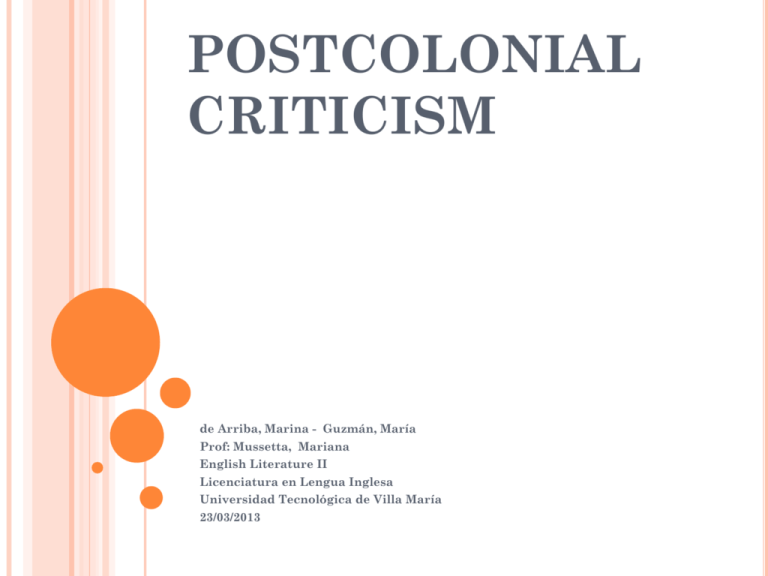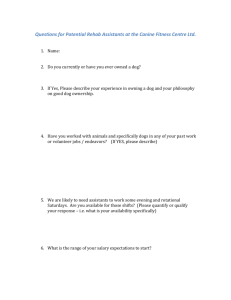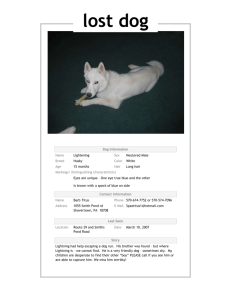postcolonial criticism - LenguainglesalicenciaturaUTN2011
advertisement

POSTCOLONIAL CRITICISM de Arriba, Marina - Guzmán, María Prof: Mussetta, Mariana English Literature II Licenciatura en Lengua Inglesa Universidad Tecnológica de Villa María 23/03/2013 POSTCOLONIAL CRITICISM (1990S) is concerned with literature produced by colonial powers and works produced by those who are/were colonized Critiques Euro-centric hegemony Questions the role of the Western literary canon and Western history as dominant forms of knowledge making POSTCOLONIAL IDENTITY Colonialist Ideology colonialist discourse - colonizers civilized, the proper “self” - native peoples savage, “the other,”evil, primitive, not fully human Edward Said ORIENTALISM Colonial Subject did not resist colonial subjugation mimicry double counciousness / double vision unhomeliness hybridity POSTCOLONIAL DEBATE White settler colonies - Canada, Australia, New Zealand, Souther Africa Politics of their own critical agenda - neocolonialism political, economic, cultural subjugation - cultural imperialism economic domination POSTCOLONIAL THEORY AND LITERATURE THEMES • The initial encounter with the colonizer and the disrupt of indigenous culture • The journey of the European ousider through an unfamiliar widerness with a native guide ( Conrad’s Heart od Darkness) • Othering and colonial oppression • Mimicry • Exile being outsider in one’s land • Post independence exuberance followed by desillusionment • The struggle for individual and collective cultural identity • Alienation • Unhomeliness • Double conciousness • Hybridity Post-colonial Criticism and Multiculturalism • How can we see Post-colonial Criticism? • Frantz Fanon: The Wretched of the Earth • Encountering “the Other” •Monoculturalism •Multiculturalism How can we see Post-colonial Criticism? • As subternal groups: - discrimination - alien culture - language • As colonizers groups: no oppression Frantz Fanon: The Wretched of the Earth •Born in 1925 in the French West Indies •Psychiatrist and leader of Algerian National Front and editor of The Wretched of the Earth where he analysed the situation of the colonized • Objectives of colonial policy: - economic exploitation - systematic negation of the other - determination and negation of the sense of identity and dignity in native people. • Confrontation between colonizers and native people generates: Manichaeism: is the extreme polarization in which people are seen as either good or evil. Encountering “the Other” •Views: - An indigenaous person in a colonized country encountered European culture. - The European settler encountering ahat seemed to him the mistery, the darkness and the thread of a native culture. •Reactions when you encounter “the Other” - Stick whith your own experience and be uninfluenced. relatively - Abandon your own culture and adopt that of the other. - develop a responde that mixes elements of yourself with elements of the other. This is called hybridization, a new form is produced which contains elements of different cultures or languages. Monoculturalism There is one dominant culture so groups with different cultural backgrounds need to assmilate themselves to the predominant culture Multiculturalism There is one than one culture which is struggling for recognition. For example native, Frence and English culture in Canada. KAMALA DAS Was born in1934 in Punnayurkulan, Malabar District, British India. Died in 2009(aged 75) in Pune, Maharashtra, India. During the first half of the 20th century, a nationwide struggle for independence was launched by the Indian National Congress and later joined by the Muslim League. The subcontinent gained independence from the United Kingdom in 1947, after the British provinces were partitioned into the dominions of India and Pakistan and the princely states all acceded to one of the new states. “Robert and the Dog” (Ken Saro-Wiwa) •Ken Saro-Wiwa´s Biography •Elements of fiction - Plot - Characters - Setting - Point of view - Symbol - Theme •Analysis Ken Saro-Wiwa´s Biography •He was born in Bori, Rivers State (Nigeria) •He was a popular author, playwriter and television producer. •He graduated from the University of Ibadan. •He worked at the government college in Umuahia, Stella Maris College and at the University of Lagos •During the Nigerian Civil war (1967-1970), he chose the Nigerian side and was the administrator for the oil depot at Bonny Island. •Then he served as a regional commissioner for education in the Rivers State Cabinet, but he was dismissed due his opinion on autonomy for the Ogoni people. •1986 He wrote A Forest of Flowers, a collection of 19 short stories “Robert and the Dog” is written. • 1990 he founded the Movement for Survival of the Ogoni People and in one of his books he criticized corruption and condemmed Shell and British Petroleum. The Nigerian government decided to break his movement and he was arrested. •I1995 he was executed, his body was burned with acid and buried in an unmarketed, common grave. Nigerian civil war It was a political conflict caused by the attemped secession of the southeastern provinces of Nigeria as the self-proclaimed Republic of Biafra. The conflict was the result of economic, ethnic, cultural and religious tensions among several people of Nigeria. Ogoni People They are one of the many indigenous people in the southeast Nigeria. They have been victgims of human right violations. In 1956 the Royal Dutch/Shell in collaboration with the British government found a comercially viable oil field and began oil production. There was oil spills, oil flaring and waste discharge, as a consequence the soil was not viable for agricultural use. Many areas was contaminated. In 1990, Saro-Wiwa and his movement planned to take action against the government and the oil companies The Movement for the Survival of Ogoni People (MOSOP) It is an Ogoni-based non-governmental, non-political apex organisation of the Ogoni ethnic minority people of SouthEastern Nigeria and was founded in 1990 with the mandate to campaign non-violently to: • Promote democratic awareness; • Protect the environment of the Ogoni People; • Seek social, economic and physical development for the region; • Protect the cultural rights and practices of the Ogoni people; and • Seek appropriate rights of self-determination for the Ogoni people http://www.mosop.org/about_us.html Elements of fiction -Plot Robert was a man who lives with his wife and six children in Ajengungle called “The Jungle”. His new employer was a young medical doctor who lived alone in an apartment. Robert was very happy with his job until the arrival of the employer´s wife and her dog called Bingo. The lady was cheerful and she took an interest in Robert´s culture. The problem was her dog because Robert could see that the dog was treated like a human being and it had a good life in comparison with his family. When his employers travelled, he had to take care of it but…on the third day he gathered all the food and the milk, tethered the dog to the settee and he walked off the house. He abandoned his job and the dog died. Characters - Protagonist: Robert - Antagonist: Bingo, the dog Setting - Time: 1986 - Place: Ajegunle (district of Lagos State, Nigeria) Point of view Third person omniscient Symbol •The dog (Western culture) •The dog´s name: Bingo Themes -The clash of two different cultures Saro-Wiwa shows how Robert compares the life of the dog to that of his children -Portrayal of poverty According to Craig McLuckie and Aubrey McPhail “Saro-Wiwa refines his general social critique down to the level of the individual. The story is one authentic pathos, as the effects of poverty and dehumaniation are revealed in a life of an honest, hardworking man who has been “accostomed to moving from household to household” from one harsh and insensitive employer to the next. He finally finds an employer, a young doctor, who treats him with kidness and respect. The dog is very well treated by the doctor and his wife, and Robert becomes resentful”. They also add that the end of the story shows “the bitter social conditions that force an individual to feel dehumanized and to leave a job where he finally “began to feel like a human being” (McLuckie, Craig and McPhail 82) Analysis •Mimicry (imitation) -A steward “… determines what is to be spent on grocery, how much food is to be served at meal times, what is to be done with the remnants of food. In short, he holds the bacherlor´s life in his hands. And that is tremendous power.” -”In his one-bedroom apartment in The Jungle, Robert was king. And he always repaired there nightly to exercise his authority over his wife and six children.” •Encountering “ the other” The European lady encountering what seemed to her the mistery: hybridization (an attemp to interact and learn with the other) “She was European and excited about her first visit to Africa. She appeared pleased to have Robert´s assistance. She spent the day asking Robert about African food, watching Robert at work in the kitchen and lending a helping hand where possible” •Colonialist Ideology - Inferiority of native people “Robert began to feel like a human being, and he felt extremely grateful to his new employers” “The dog appeared as important to the lady as her husband and, indeed, Robert thought, in the order of things, the dog as more important than himself” •Double consciousness (perception of a world divided in 2 antagonist cultures) Robert “..could understand a dog being invited to eat up an infant´s faeces. He could understand a stray, mangy dog with flies around its ears being eaten and chased away from dwellings of men. He could understand a dog wandering around rubbish heaps in search of substenance. But a dog who slept on the settee, a dog who was fed tinned food on a plate, a dog who was brushed and cleaned, a dog who drank good tinned milk, was entirely beyond his comprehension.” •Metaphors “Because every bachelor is as wax in the hands of his steward” “But each wag of his tail was like so many pinprincks in the heart of Robert, who secretely vowed to “show” the dog some day.” •Manichaeism “Robert´s new employer was a young medical doctor just returned from abroad. He Was cheerful, exuberant and polite. It was obvious to Robert that he had not been in the country for a long time. Because he did not once lose his temper, he did not shout At Robert, he called him about his wife, children and other members of his family” WOLE SOYINKA He was born on 13 July 1934 at Abeokuta, western Nigeria Lived in Great Britain during six years Nobel Prize in literature During the civil war in Nigeria, Soyinka appealed in an article for cease-fire. For this he was arrested in 1967, accused of conspiring with the Biafra rebels, and was held as a political prisoner for 22 months until 1969. He writes in English and his literary language is marked by great scope and richness of words. “White Comedy” (Benjamin Zephaniah) • Benjamin Zephaniah´s Biograph •Themes •Glossary of the poem •Analysis Benjamin Zephaniah´s Biograph He is an English writer, dub poet and Rastafarian He was born in Birmingham, England He is son of a Barbadian postman and a Jamaican nurse By the age of 15, his poetry was already known among AfroCaribbean and Asian communities. He decided to expand his audience and he travelled to London. In some books, he wrote against British legal system and celebrated cultural diversity in Britain. In 1996 he wrote “White Comedy” in Propaganda Since 2008 he has divided his time between Beijing and a village in Lincolnshire. Dub poetry It is a form of performance poetry of West Indian origin, which evolved out of dub music consisting of spoken word over reggae rhythms in Jamaica in the 1970. The dub poet usually appears in stage with a band performing music specially written to accompany each poem Rastafarian movement It is a spiritual movement that arose in the 1930 in Jamaica. They reject Western society Themes Duality between colonized and colonizers Inferiority of native people According to the poem “expresses in different ways the extent to which racial domination can permeate a society and the social distance which can separate black people and white people. Almost always the white person or white group in a situation of superiority, and the black group in a situation of inferiority, lesser power or influence, and having to justify themselves.”. Glossary of the poem black comedy an amusing play, story that is funny but it also shows the unpleasant side of human life blackmail the practice of obtaining money or advantage by threatening to make known unpleasant facts about a person or group black magic magic believed to be done with the help of evil spirits and used for evil purposes white magic magic used for good purposes white lie a harmless lie black sheep someone who is thought by other members of their group to be a failure or to have brought shame on the group blacksmith a metalworker who makes and repairs things made of iron white collar: a worker who has a job in offices, banks, etc. rather than jobs working in factories black spot a place or area where there are more problems than usual blackwater fever a very severe form of the disease malaria blacklist a list of people, groups, countries, etc., who must to be avoided or punished in some way blackleg someone who continues to work when their fellow workers are on strike black art is black magic Black Death the illness that killed large numbers of people in Europe and Asia in the 14th century blackjack a card game // a weapon like a stick covered with leather used to hit people Black Watch the common name for the Royal Highland Regiment, a regiment (=large division of men) in the British army blackguard a man of completely dishonourable character black economy the business activity that is carried on unofficially, especially in order to avoid taxes Blackshirt a member of a fascist organization having a black shirt as part of its uniform (from the Italian Fascist Party before the Second World War, whose members wore black shirts) Black Mass a ceremony in which worshippers of the devil use forms like those of Christian worship Black market: the system by which people illegally buy and sell foreign money, goods that are difficult to obtain. wog very offensive word for a black person To slave to work very hard with no time to rest To brand a) to describe someone or something as a very bad type of person or thing ofter unfairly; b) to burn a mark onto something, especially a farm animal in orden to show who it belongs To hail to describe someone or something as being very good Analysis Zephaniah employs black humor in order to tell a funny story that deal with the unpleasant parts of human life. He plays with language using the words black and white: Black has negative connotation and this word gives the idea of darkness and evil White has a positive meaning for example cleanliness, goodness Symbols Irony Simile Connotation Inferiority Colonialist ideology Mimicry Othering Neocolanization Double conciousness Colonizers with political domination economic exploitation “Still I Rise” (Maya Angelou) Symbol: dust Tone: sureness and pride Manichaeism Double conciousness Resistance to colonialist ideology Work Consulted Bonnycastle, Sthephen. (2007) In Search of Authority: An introductory Guide to Literary Theory. 3rd Edition. Peterborough, Ontario: Broadview Press. Tyson, Lois. (2006). Critical Theory Today: A User-Friendly Guide. 2nd Edition. New York and London. Routledge. Saro-Wiwa, Ken. (1986) A Forest of Flowers. California University. Saros International Publishers. Zephaniah, Benjamin (1996) “White Comedy” in Propaganda.









